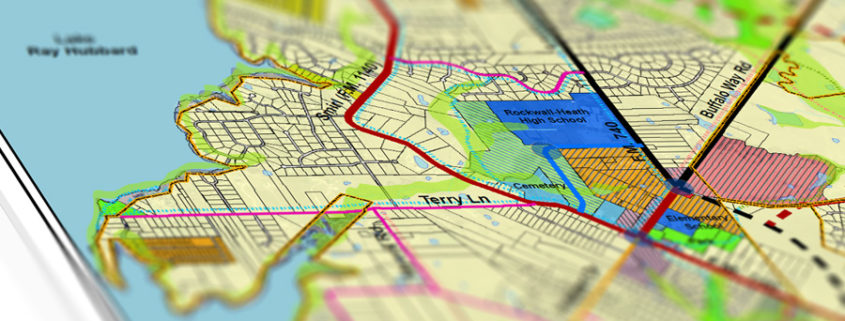THE PLANNING AND ZONING PROCESS – HOW DOES IT WORK?
What is Zoning?
Zoning designates legal areas in a municipality to permit and prohibit specific land uses. Zoning is a technique of land-use planning used by local governments in most developed countries.
There are a great variety of zoning types, some of which focus on regulating building form and the relation of buildings to the street with mixed-uses, known as form-based, others with separating land uses, known as use-based or a combination thereof.
Similar urban planning methods have dictated the use of various areas for particular purposes in many cities from ancient times.
Heath’s Land Use Map illustrates the current and future land use within the City and the extra territorial jurisdiction (ETJ) of the City, while Heath’s Zoning Map illustrates zoning districts and the Zoning Ordinance contains the specific regulations governing allowed uses, parking requirements, height, setbacks, landscaping and other items.
Who can Request Rezoning?
Only three entities may initiate a rezoning:
- The property owner
- The Heath Planning and Zoning Commission
- The Heath City Council
What is the Process for Re-zoning a Property?
When a property owner submits a rezoning request to the City, several actions are taken:
- The City places a sign on the property advertising the requested zoning change 10 days prior to the Planning & Zoning Commission meeting.
- City planning staff review and discuss the request with the applicant as to its conformance with the Comprehensive Plan, Thoroughfare Plan and other adopted guidelines of the city. Staff then formulates a recommendation to the Planning & Zoning Commission for approval or denial based on this review.
- Written notices of the public hearing before the Planning & Zoning Commission and the City Council are sent to all property owners within 200 feet of the property to be rezoned, as required by state law. The notice includes a response letter that can be sent back registering the property owner’s support or opposition to the case.
- The Planning & Zoning Commission holds a public hearing at their regular meeting, and anyone can get up and speak for or against the case. The Commission may recommend approval, denial, or to table a zoning request. If the Commission recommends approval, the case is automatically scheduled for a public hearing before the City Council. If the Commission denies a request, the recommendation is sent forward to the City Council and requires a three-forth majority vote for approval.
- Notice of the public hearing before the City Council is published in the newspaper at least 15 days in advance of the hearing. The City Council will hold the public hearing, and may approve, deny, or table the applicant’s request.
Are there Special Types of Zoning?
PD: A planned development (PD) district is most often used when an applicant’s proposal does not fit neatly into the City’s existing Zoning Ordinance. The creation of a planned development district results in special restrictions or allowances that are only applicable within that particular district.
CUP: Conditional Use Permits (CUP) are also a specialized form of zoning. A CUP allows a use that may be appropriate in some locations in a given district but not all.
How can Property Owners get Involved?
Citizens are invited to attend Planning and Zoning Commission meetings, regularly scheduled for the first Tuesday of the month at 6:30 p.m. Citizens are also encouraged to attend City Council meetings, regularly scheduled for the second and fourth Tuesday of each month at 6:30 p.m. Sign up for “Notify Me” at www.heathtx.com, and you will receive an email alert when agendas are posted for these meetings.
Specific questions and concerns regarding zoning and development should be addressed to City staff at (972) 961-4875.
Tips for Presentations before the Planning & Zoning Commission & City Council
Homeowner groups should designate two or three representatives to speak on their behalf, rather than have 50 people say the same thing repeatedly. It is much more effective to ask your group to stand to show opposition or support.


